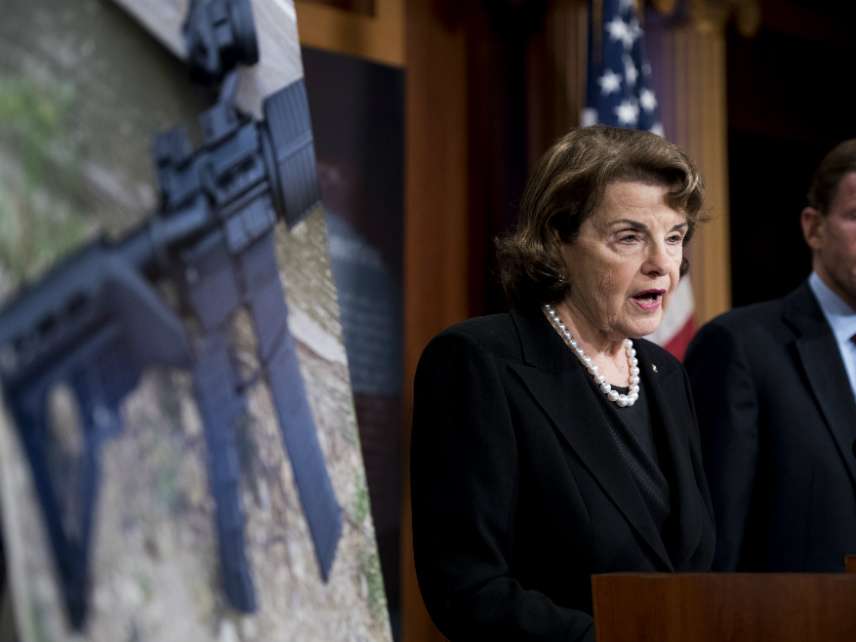Rapid-Fire News Cycle Leaves Bump Stocks Behind
So, too, have the politicians who said they really, really wanted a ban on the firearm accessory.

One month ago today, Stephen Paddock killed 58 people and wounded another 500 at a country music concert in Las Vegas. Out of the inevitable gun control debate that followed, politicians from both major political parties came to a rare and unusual agreement. We'd all be better off without bump stocks.
A rather obscure and gimmicky weapons modification found on several of the weapons in Paddock's Mandalay Bay Hotel room stockpile, bump stocks, in a matter of a few days, came to represent a way out of an endless stalemate.
Everyone from Sen. Diane Feinstein (D–Calif.) to the leadership of the National Rifle Association was on board with some form of restriction and a flurry of bills were introduced to prohibit them outright.
Today, people seem to have forgotten all about them.
Google search trends show a near-complete leveling off of interest among the general public. Politicians have moved on too, at least for the time being. No hearings have been scheduled on any the bump stock bill currently in Congress. Republican lawmakers have become increasingly cagey about what they plan to do about the device.
Witness Ron Johnson (R–Wisc.), the first Senate Republican to endorse a ban, who now can't seem to decide if that ban requires legislation or if regulators can handle it on their own.
When a bipartisan bill requiring background checks for bump stock purchases was introduced in the House of Representatives yesterday, the New York Times failed to run a story on it. This despite the paper previously running editorials and op-eds calling for everything from a bump stock ban to the abolition of the Second Amendment.
What little coverage of bump stocks there has been from major news outlets has been to ask where all the coverage is of bump stocks.
"It's Been One Month Since The Las Vegas Shooting And Bump Stocks Are Still Legal," the Huffington Post complains. "A month after Las Vegas carnage," a USA Today editorial says today, "bupkis on bump stocks."
Most of the stories predictably blame the gun lobby for the lack of action. CNN Editor-at-Large Chris Cillizza, interestingly enough, blames the news cycle itself, saying that "amid the everything-all-at-once nature of news under President Trump, things get lost. Many don't matter. Others should. A lot."
There's a lot truth in Cillizza's observation.
Since the Las Vegas shooting, we've had our national attention diverted to post-hurricane suffering in Puerto Rico, sexual harassment allegations against what seem like thousands of famous Hollywood and media personalities, charges in the neverending Russiagate investigation, and a terrorist attack in New York City.
What Cillizza misses, however, is the same vapid news cycle is responsible for supposedly serious politicians taking a bump stock ban and its impact seriously in the first place. Reason, among a precious few others, questioned whether a device derided as an ineffective novelty by serious gun enthusiasts would have any effect on gun crime in America. Reason's Jacob Sullum asked whether a device that sacrifices accuracy for speed could have added to death toll in Las Vegas.
Spitting out of the whirling news cycle were demands for spur-of-the-moment responses which lawmakers were only too happy to provide. The results were bans and the submitting of sloppily drafted bills focusing on a device nobody had ever heard of.
A month from the deadliest mass shooting in American history Slide Fire, the Texas company that suspended shipments and withstood withering scrutiny for having claimed to have invented bump stocks, announced that it is taking orders again.
It will be interesting to see if any of the authors of those dormant bump stock ban bills took notice.
Rent Free is a weekly newsletter from Christian Britschgi on urbanism and the fight for less regulation, more housing, more property rights, and more freedom in America's cities.


Show Comments (78)